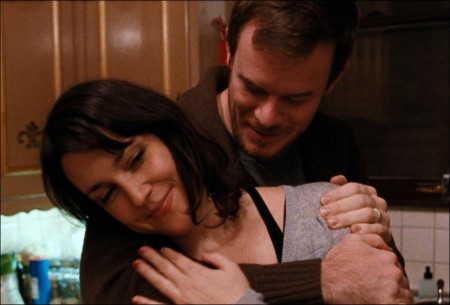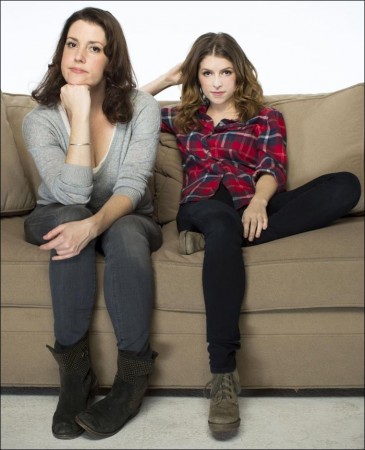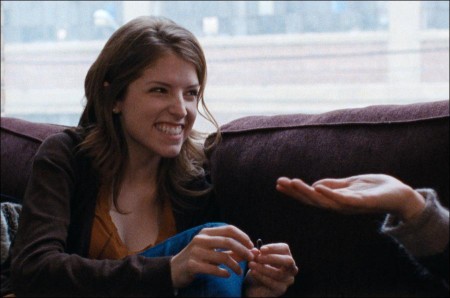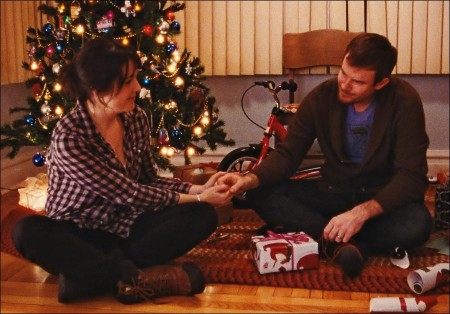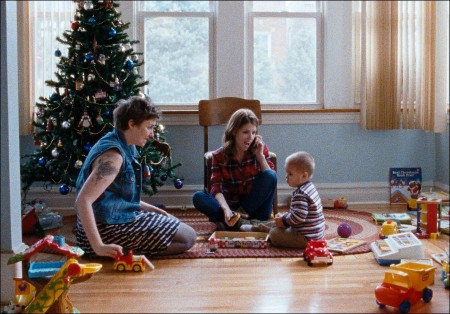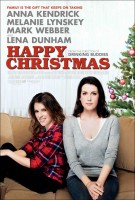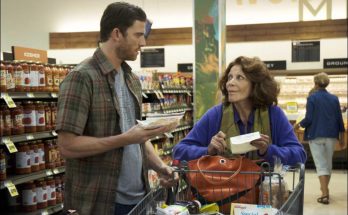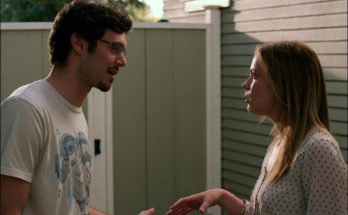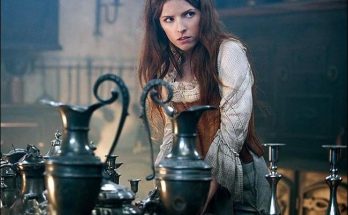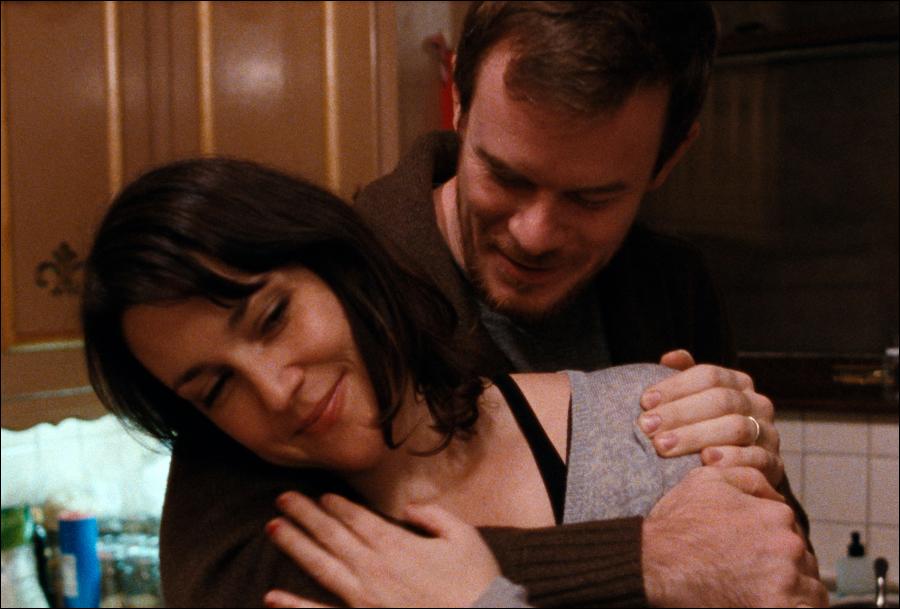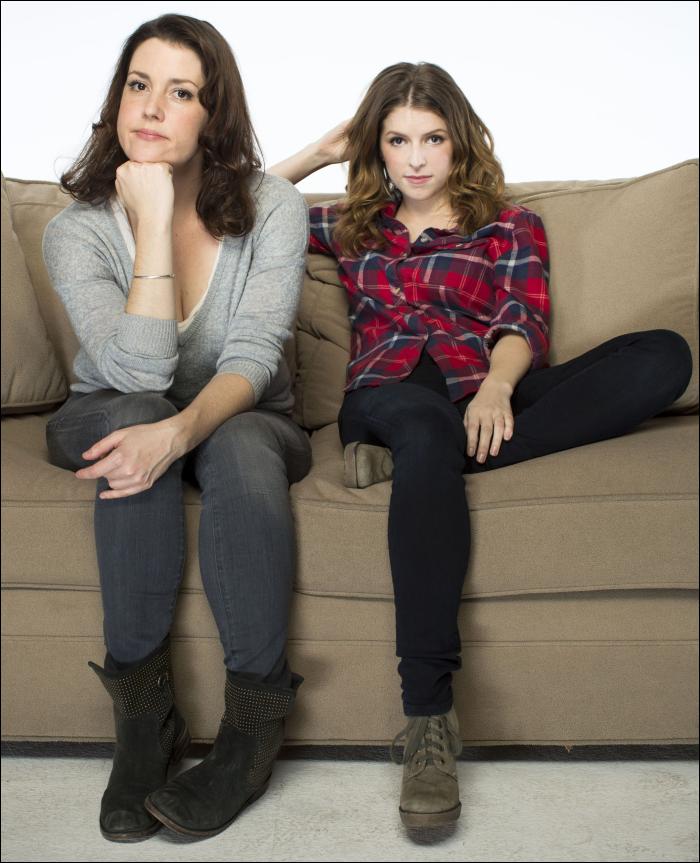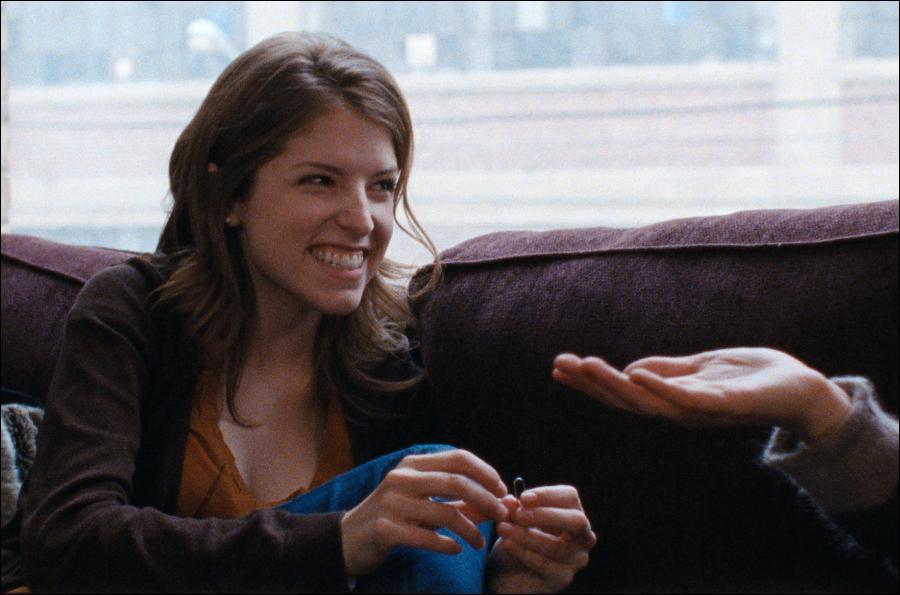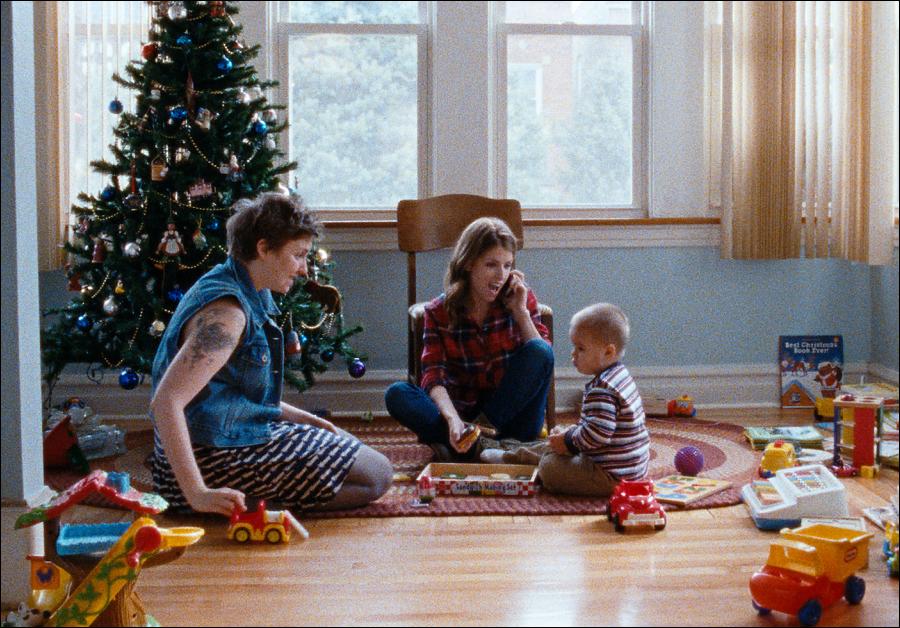Taglines: Family is the gift that keeps on taking.
A budding novelist and her film director husband, Kelly (Melanie Lynskey) and Jeff (Joe Swanberg) and their two-year-old son live a peaceful existence in Chicago. But when Jeff’s irresponsible younger sister, Jenny (Anna Kendrick), comes to live with them after a breakup, things start to change. Jenny begins a rocky relationship with a baby sitter-cum-pot dealer (Mark Webber), and she and a friend, Carson (Lena Dunham), instigate an evolution in Kelly’s life, as her career and her relationship with her husband begin to grow in new directions. But are they welcome ones?
Happy Christmas is an American dramedy written, produced and directed by Joe Swanberg. It stars Swanberg, Anna Kendrick, Melanie Lynskey, Lena Dunham and Mark Webber. Like most of Swanberg’s previous features, the film’s dialogue was entirely improvised.
The film premiered at the 2014 Sundance Film Festival (where it was nominated for the Grand Jury Prize in the U.S. Dramatic Competition) on January 19, 2014. Magnolia Pictures and Paramount Pictures jointly acquired the international distribution rights prior to the film’s premiere screening. It was released theatrically on July 25, 2014 in the United States.
About Happy Christmas
No two sibling relationships are ever the same. Whether it’s a brother and a brother, a sister and a sister, or, as is the case in HAPPY CHRISTMAS, a brother and a sister, these relationships carry with them lots of memories, good and bad, along with lots of baggage. And let’s not forget expectations – plenty of those to go around.
Filmmaker JOE SWANBERG experienced all of the above firsthand not long ago, when, after buying a house with his wife, Kris, the couple received a house guest: Joe’s younger brother. Their short-stay houseguest turned into a three-month roommate. “It got me thinking about the idea of family, and what that really means,” the director says.
He and his wife had a new baby boy, Jude, so Swanberg began moving the idea forward in his mind about what it meant to have that younger sibling around. “It was the idea of young parents starting their own family, but having to take on a parental role to a younger sibling. I thought it would be funny if your house guest, who you hoped would help out with some of the parenting, actually needed parenting themselves. What if they added to your parent responsibilities, rather than alleviated them?”
Another issue raised in the film was the impact that having a child has on a couple composed of two artists, like Joe and Kris, who is a filmmaker herself. “I particularly wanted to talk a lot about what it’s like for mothers who are artists, who end up becoming stay-at-home moms instead of being able to practice their art. What feminist issues does that raise? What are the upsides and drawbacks to that? I just wanted to dig around in that territory and see what could be discovered.”
As with almost all of Swanberg’s previous films, these ideas didn’t generate a HAPPY CHRISTMAS screenplay. Instead, the dialogue was improvised by the actors. “Improvisation was something I hit upon as a storytelling method coming out of film school,” he recalls. “I was overwhelmed with the amount of bad movies my friends and I were making in school.”
He began thinking about how to get a more interesting story out of his non-actor fellow-students. “I realized that, when you’re working with non-professional actors, the only way to get interesting, realistic performances from them is to let them play themselves, essentially. To not ask them to have to deliver lines and traditional performances.” Ten years hence, he says, “I’m now working with highly-trained professional actors. But I’ve discovered I still really like the collaborative approach I get from working with actors in an improvisational world.”
Rather than write a traditional script, Swanberg creates an outline with the scenarios he envisions for his film. “So rather than me sitting in a room inventing all of these characters and writing dialogue for them, I’ve found that if I create scenarios and let the actors explore them, they’re plenty capable of filling in not only the dialogue, but also interesting character subtleties. Instead of doing something formulaic, we stare into the void together and manufacture a story out of what feels right in the moment.”
Swanberg’s films tell stories by creating situations that are either autobiographical – pulled from his own life and those of his actors – or heavily based on real events. “I just let a scenario play out between people in a room and capture it on camera,” allowing the editing process to then become the writing process.
Casting for a film that will be made this way requires a non-traditional process as well. “It’s tricky with improvisation,” he says, “because I need to work with actors who are not only intelligent, but have an ability and a willingness to mine their own personal lives for material for the movie. I’m asking people to use their own real words and to use their own thought process to behave and act in these situations. Ultimately, that requires somebody to fall back on their own personal feelings about things.”
The actors have no script, so they can’t spend the traditional time creating a character and prepping for scenes. “I’m throwing five scenes a day at them that we’re essentially talking about right before we shoot. So they really have to exist in the moment.”
Casting Kelly (Melanie Lynskey) for HAPPY CHRISTMAS was as easy for Swanberg as referring back to the casting of his previous film, Drinking Buddies. The director had interviewed New Zealander Melanie Lynskey for the film, though ultimately went another direction. “I knew she wasn’t the right fit for that film, but I right away started thinking about how I could create a new project, just to work with Melanie,” he says. As Lynskey recalls, “I met with him then, and we just sat and talked about relationships and life. I wasn’t quite what he was thinking for that movie. But he got in touch with my agent and said that he wanted to do something with me in the future.”
After post production was completed on Drinking Buddies, Swanberg got back in touch. “When I hit upon the idea of a young family, and thinking about when my brother had lived with us, it just made sense that Melanie would end up being Kelly in this movie.”
Though not a mother herself, Lynskey related through the experience of a number of friends in Kelly’s position. “A lot of my female friends grew up identifying as feminists,” she relates. “Then, once a woman has kids, you find yourself in the position of a stay-at-home mother, essentially a housewife. And your instincts are saying, ‘This is where I want to be at this point in my life.’ But everything else that you’ve believed and the career you’ve built falls by the wayside. So it’s a really strange place for a lot of women to find themselves in.”
A fan of Swanberg’s films, like Hannah Takes the Stairs and Nights and Weekends, the director’s improv shooting method immediately appealed to the actress. “I grew up in New Zealand doing comedy improv, so that’s where my heart is. It’s something that I’m very comfortable with and very familiar with. So this was a good fit.” Swanberg felt the same. “I felt right away she was somebody who was comfortable talking about herself and her personal life and also seemed excited by the challenge of the existing-in-the-moment approach.”
Swanberg gave Lynskey some backstory to work with: her character had written a novel in New Zealand and was critically successful there, but hadn’t been a hit in America. Adds Lynskey, “The acclaim it received back home never felt real to her, because she considered New Zealand such a small place, so she kind of dismissed it. So I think her move to another country was an escape. She moved countries and fell in love and ended up in this life that she never thought she would really have. But she’s never really found herself.”
Swanberg himself plays her filmmaker husband, Jeff. “I’ve acted in some of my films, and not acted in others,” he says. “In this case, I talked to Melanie about it, and she said that she would like to act with me, which was a great vote of confidence.” In addition, the director’s baby, Jude, would be appearing in the film. “My being there playing his dad was really advantageous, because it made those interactions a lot more authentic, rather than putting a two-year-old in a situation where they had to pretend somebody else is their dad.”
Kelly and Jeff’s relationship is a healthy one, warm and communicative. “I think there’s a lot of support there,” says Lynskey. “But it’s hard when one person ends up becoming the primary caretaker for the family. It puts a strain on the relationship, even when you have the greatest partner in the world.” The couple’s growing awareness of that strain became the focus of the story. “It’s about how to manage that relationship and give each other enough space that they can be individuals, as well as a couple and a family.”
ANNA KENDRICK, with whom Swanberg already had a close working relationship from her work in Drinking Buddies, appears as Jeff’s younger, irresponsible sister, Jenny. “Jenny’s not actually anything like my brother,” Swanberg says. “But I wanted to flip those gender roles, in order to connect the women in the film.”
Swanberg designed the sibling relationship between Jenny and Jeff carefully. “I wanted them to be friendly, but not really friends.” Adult siblings, he notes, often define each other by their childhood behavior. “In his head, Jeff has essentially decided that she’s like she was in the past – irresponsible, flaky, not very dependable – broad characterizations he just accepts. He sees her get really wasted the first night and just says, ‘Yeah, this is who she is. I already know this.’”
It’s much harder for Kelly to accept, however. “They’ve known each other a long time,” Lynskey describes. “Kelly’s natural inclination is to be a support system for Jenny, because she’s come to live with them after a breakup. But that’s not necessarily what Jenny is looking for, and Kelly doesn’t know how to connect to her.”
She’s particularly upset by Jenny’s irresponsible behavior. “There’s a part of her that’s disappointed. Kelly’s a really long way from her own family, and I think she was excited to have a kind of sister figure in her life. So she had a lot of hopes for the relationship, and she’s disappointed pretty quickly when she sees how Jenny is behaving.”
Happy Christmas
Directed by: Joe Swanberg
Starring: Anna Kendrick, Melanie Lynskey, Mark Webber, Joe Swanberg, Lena Dunham, Jude Swanberg
Screenplay by: Joe Swanberg
Cinematography by: Ben Richardson
MPAA Rating: R for language, drug use and some sexual content.
Studio: Magnolia Pictures
Release Date: June 26, 2014
Visits: 97
